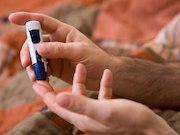Findings suggest family and friends’ support of autonomy also lowers diabetes distress
WEDNESDAY, April 18, 2018 (HealthDay News) — Family and friends’ autonomy support may lead to better glycemic control by reducing distress among patients with diabetes, according to a study published online March 29 in Diabetes Care.
Aaron A. Lee, Ph.D., from the VA Center for Clinical Management Research in Ann Arbor, Mich., and colleagues surveyed 308 veterans with type 2 diabetes and one or more risk factors for diabetes complications to assess diabetes distress and perceived autonomy support from their main informal health supporter. Electronic medical records were used to access hemoglobin A1c (HbA1c) data from 12 months before and after the survey.
The researchers found that diabetes distress (P = 0.023) was associated with higher, and autonomy support (P = 0.032) with lower, subsequent HbA1c levels. The relationship between diabetes distress and HbA1c (P = 0.027) was moderated by autonomy support. With low autonomy support, greater diabetes distress was associated with higher HbA1c (P = 0.002), but not with high autonomy support (P = 0.890).
“Autonomy support from main health supporters may contribute to better glycemic control by ameliorating the effects of diabetes distress,” the authors write. “Interventions that reduce diabetes distress and enhance the autonomy supportiveness of informal supporters may be effective approaches to improving glycemic control.”
Copyright © 2018 HealthDay. All rights reserved.








